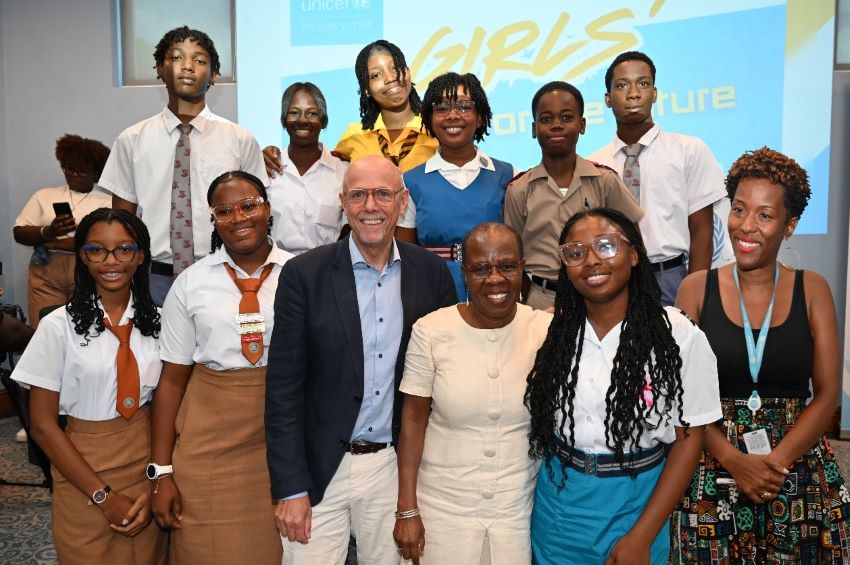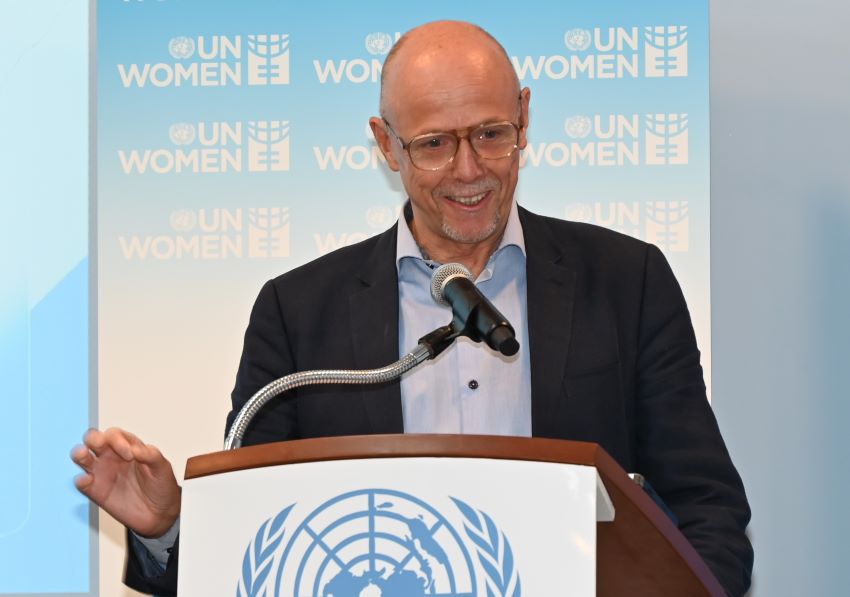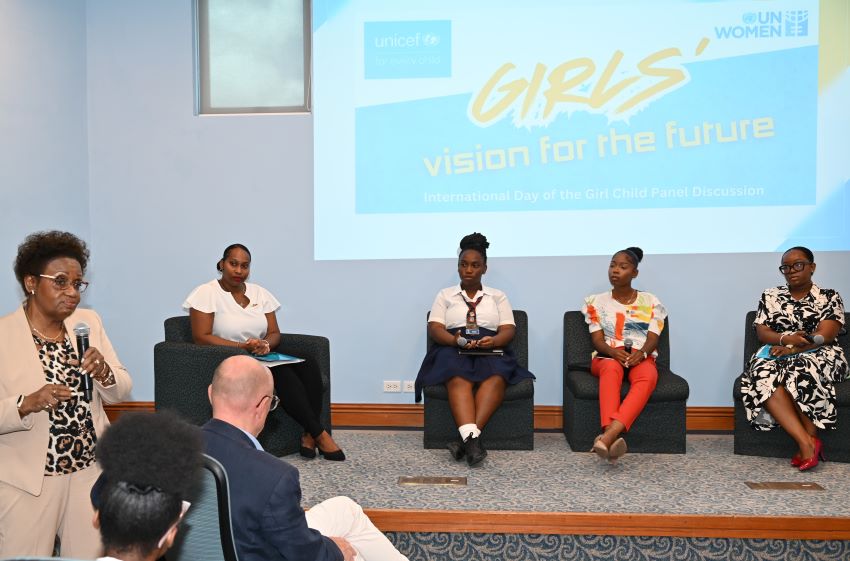
It is widely recognised that the Caribbean has made great strides with gender equality, and there is now growing optimism by some young girls. However, there are still some issues that confront us – a gender pay gap still exists; STEM subjects continue to target boys more than girls; and legislation still has to be passed to protect girls from all forms of abuse.
These were among the many issues detailed by officials as they addressed the start of a recent panel discussion in support of International Day For the Girl Child, at UN House Marine Gardens, St. Michael. The event was held under the theme “Girls’ Vision For the Future”.
UNICEF Representative for the Eastern Caribbean Area, Pieter Bult, noting the recent global research from UNICEF, which stated that girls were envisioning the days ahead with confidence and optimism, said: “The majority of adolescent girls, 80 per cent or more, believe life will get better in the next few years. You see a brighter world, and you’re reaching for it.
“We have made great strides in the Caribbean in terms of gender equality and girls’ leadership. In fact, in many areas, girls are already surpassing boys. For example, young women graduating from The University of the West Indies outnumber young men, and the 2022 ILO report said that the Caribbean leads the world in terms of women managers.”
Mr. Bult, though referring to this as impressive, quickly added that it did not reflect the full story. He stated: “In a U-report poll we conducted in Barbados and the OECS in 2023, girls told us that they were disproportionately affected by sexual abuse and were much more likely than boys to be subjected to forced sex, unwanted touching, and online sexual harassment.”
Stressing it was necessary to protect girls everywhere against this and all other forms of violence and abuse, he noted that some 45 million girls and women in Latin America and the Caribbean reported having been affected by sexual violence before the age of 18. Survivors of such violence, he added, face increased risk in adulthood, including substance abuse, anxiety, and depression.
“Humanitarian crises – to which this region is alarmingly prone – have disproportionately affected girls who have unique needs and priorities. Girls displaced by emergencies are more likely to face child protection concerns, such as sexual predation. Personal hygiene issues, including the lack of access to menstrual products, can also affect their quality of life.”

The UNICEF Representative further revealed that despite girls achieving more academically, the region had to address the imbalance in boys and girls taking science, technology, engineering, and math (STEM) subjects. “Proficiency in these areas will be critical in a new technology driven world. Unfortunately, across Latin America and the Caribbean, less than 30 per cent of graduates in these fields are female,” he stated.
With respect to the gender pay gap, while noting that women were still earning less than their male counterparts, Mr. Bult said Barbados was doing a bit better than other countries, with the World Economic Forum finding that women in this country earn 87 per cent of what men earn for the same positions. However, he added “better, yes, but clearly not good enough”.
Looking to the future, the UN official conceded that it was girls, themselves, that could best tackle these challenges and ensure they step into an exciting future with meaningful change.
“It is you the girls, and we must listen to you as the current and future leaders and change agents; you are adopting a girl-centred approach in putting you at the very heart of the design and implementation of policies, programmes, and activities. We must support your participation and leadership at community, national, regional, and global levels.
“We must scale up funding to promote girls’ rights and well being as we accelerate action towards the Sustainable Development Goals. We must protect your rights to inclusive education, economic empowerment, good nutrition, and good health, including sexual and reproductive health. You must be allowed to claim the space you need, to live the life you want,” Mr. Bult stressed.
Meanwhile, Director of the Child Care Board, Roseann Richards, who delivered remarks on behalf of the Ministry of People Empowerment and Elder Affairs, stressed the important role played by organisations coming together on the day, had to do with advocacy.
She declared: “For all parents, institutions, entities, and all those who care about girls, this day belongs to us. On this day, the Ministry of People Empowerment and Elder Affairs and the Child Care Board, the state sole child protection agency, along with other key known stakeholders, must come together and advocate for our girls and their rights.
“In Barbados, girls are provided with opportunities for a place and a space in our educational institutions, from nursery to primary and secondary and to tertiary. So, our girls enjoy the right to education. Our girls also enjoy the right to good health, another key pillar which ensures their potential for development. Our girls enjoy adequate nutrition as well, even though there are some challenges with the sweeten stuff.”

Ms. Richards, however, noted that despite these rights to education, health, and nutrition, there were areas of concern. Echoing similar sentiments to Mr. Bult, she emphasised that girls in Barbados were still experiencing abuse of all forms and shared that these include emotional, physical, sexual, and/or neglect.
“The child abuse statistics reflect the danger of some of our pre-teen and adolescent girls and what they experience, particularly sexually and physically. They are still challenged by becoming pregnant throughout their teen years and this is not a new phenomenon, but something that must be worked on continuously so that it can be reduced,” said the Child Care Board Director.
Acknowledging that the Ministry, with the support of her organisation, has been able to pass into law the Child Protection legislation, Ms. Richard added that it protects the island’s girls and boys.
And she remarked: “This legislation also makes provision for our secure treatment facility to provide psychosocial support for children in care, who are in need of such support. This new legislation and the establishment of the secure treatment facility aligns with this year’s theme “Girls’ Vision For The Future”.
“It is indicative of my Ministry’s and my agency’s actions to ensure that girls in state care and in our country are provided with the tools, education, health, adequate nutrition, and psychosocial support that give them that hope for a brighter future. What is critical to this theme being exemplified and realised is the opportunity, the safe space, and the right support, including that of families and communities to ensure that our girls become involved and readily accept and undertake their place as future leaders.”
